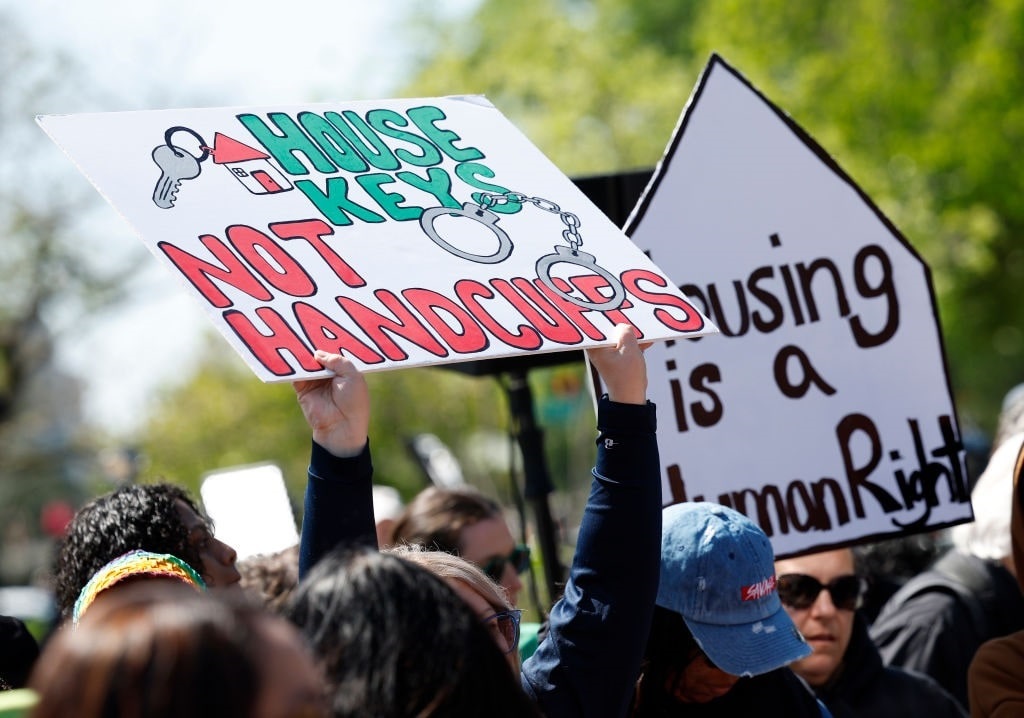Homelessness is a serious problem across the nation, and the question of how cities and states can legally deal with tent cities and other encampments has become a huge focus for local governments. On April 22, Supreme Court justices discussed the Grants Pass v. Johnson case, in which some homeless filed a suit against the Oregon city, claiming that making sleeping outdoors illegal is a violation of the 8th Amendment. The case was heard last year by the Ninth Circuit Court of Appeals, which ruled that banning homeless camps is “cruel and unusual punishment.” However, now the Supreme Court is looking it over to decide, among other things, if such decisions should even be made at the federal level.
Homeless vs Public Safety
The more than two-hour hearing considered two main points: whether there is a constitutional provision to allow local governments more control to enforce laws against homeless encampments, and the humanitarian aspect of people needing shelter and a place to sleep. As the justices and attorneys debated the issues, Justice Ketanji Brown Jackson asked attorney Theane D. Evangelis, who represents Grants Pass, about any legal ramifications should the city decide to “execute homeless people,” to which she responded that it would be found to be “cruel and unusual punishment.”
 Justice Sonia Sotomayor asked, “What about cities without compassion? Where are they [homeless] supposed to sleep? Are they supposed to kill themselves?”
Justice Sonia Sotomayor asked, “What about cities without compassion? Where are they [homeless] supposed to sleep? Are they supposed to kill themselves?”
Grants Pass is a town of around 40,000 people in southern Oregon. In 2013, after citizens began complaining about people sleeping, defecating, and urinating in public, the local government passed several ordinances and began enforcing laws to prevent people from using sleeping bags, tents, cardboard boxes, and other equipment outdoors. Three homeless individuals challenged the ordinances in 2018, saying they are protected by 8th Amendment. After the Ninth Circuit Court of Appeals agreed, some elected officials argued it has only worsened the problem.
The Ninth Circuit had previously ruled in an Idaho case that it was unconstitutional to clear homeless camps and criminally charge individuals unless enough housing and shelters were available for them.
As homelessness surges, local leaders on both sides of the aisle argue their hands are tied by such decisions. Many cities and states have spent millions, even billions, of dollars in programs to provide housing and other amenities for the unsheltered. During a news conference last week, California Democrat Gov. Gavin Newsom described his experience dismantling a tent camp in Oakland. He said it “felt like a scene out of a ‘Raiders of the Lost Ark’ where, you know, thousands and thousands of rats appeared running all around us.” He added, “This is to me just about common sense, not about ideology.”
Staff photo by Gregory Rec/Portland Press Herald via Getty Images)
Where does one draw the line between compassion for the unfortunate and the health and public safety of citizens? Justice Amy Coney Barrett asked about how the 8th Amendment could be used in other scenarios, such as punishing people for stealing food. “How do we draw these difficult lines about, you know, public urination and those sorts of things?” she asked.
Criminally charging the homeless for camping in public is not just a means for punishment, according to supporters of the Grants Pass ordinances, but a way to incentivize them to seek and take advantage of shelters and other social services available to them. Officials argued that many who refuse to utilize shelters prefer the freedom of sleeping outdoors. “These generally applicable laws prohibit specific conduct and are essential to public health and safety,” Evangelis explained.
Kelsie Corkran, attorney for the homeless plaintiffs, stated, “Homelessness is not something that you do. It’s just something that you are.” However, the defenders of the Oregon town’s ordinances say they criminalize the act of camping in public, not the fact that the person is homeless.
Justice Elena Kagan disagreed, saying, “Sleeping is a biological necessity. It’s sort of like breathing. I mean, you could say breathing is conduct, too. But, presumably you would not think that it’s OK to criminalize breathing in public, and for a homeless person who has no place to go, sleeping in public is kind of like breathing in public.”
Justice Neil Gorsuch, however, asked if it would then be a right to urinate and defecate in public if restrooms are not available.
Evangelis argued that the Ninth Circuit’s approach had “proven unworkable” and that the Supreme Court should “end the Ninth Circuit’s failed experiment, which has fueled the spread of encampments while harming those it purports to protect.”
There are nearly 600,000 homeless people in the United States, and that number continues to grow, especially with the influx of illegal migrants flooding into the nation. Many cities and states are watching what the Supreme Court will decide, but that decision will not likely come down until June or later.




